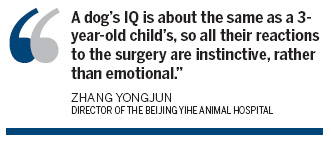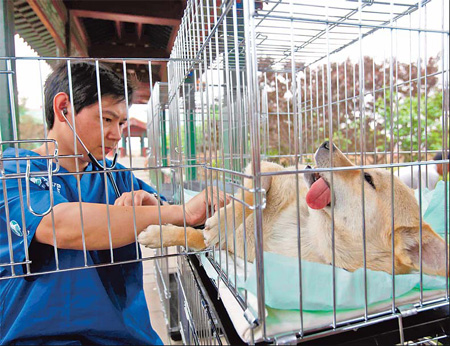Top Stories
Canine neutering project is kindest cut for pet owners
By Wu Wencong (China Daily)
Updated: 2010-06-01 07:49
 |
Large Medium Small |
|
A volunteer from International Fund for Animal Welfare checks a stray dog on Monday. GUO TIELIU / FOR CHINA DAILY |
Hospital aims to snip down the number of citywide strays
Dogs in Baocun village of Huangcun town in Daxing district were sterilized free of charge on Monday in the inaugural Companion Animal Spay Relay Project.
"The whole process included registration, a 10-minute physical examination, a 20-minute surgery and postoperative observation that lasted 30 minutes to one hour," said Dr Zhang Yongjun, a volunteer veterinarian.
Zhang, director of the Beijing Yihe Animal Hospital, has been doing sterilization surgeries for more than 10 years.
Even pregnant dogs can undergo the surgery, but at a higher risk, said Zhang.
"A dog's IQ is about the same as a 3-year-old child's, so all their reactions to the surgery are instinctive, rather than emotional, as some people think," Zhang told METRO.

Dr Kati Loeffler, an Austrian veterinarian who has been working in China on animal protection for eight years, offered last-minute instructions to the participating veterinarians and assistants before the surgeries began.
"These dogs are not used to being handled, so please be gentle with them, even if they try to bite you," said Loeffler.
The Companion Animal Spay Relay Project aims to sterilize as many dogs as possible under international standards for animal welfare and veterinary practice.
Ultimately, the goal is to reduce the number of stray dogs in the capital.
Many dog owners lauded the effort.
"I have wanted to do the surgery for a long time but had nowhere to turn to before this chance," said Jia Zhenkuan, a villager who owns a 2-year-old female dog.
The project was launched by the International Fund for Animal Welfare (IFAW), the Animal Husbandry and Veterinary Station of Beijing, and the Beijing Small Animal Veterinary Association.
It was implemented with the help of more than 20 veterinarians, veterinary nurses and volunteers.
Baocun village was carefully chosen as the project's first stop, according to Ge Rui, Asia regional director of IFAW.
"Baocun village is located in the rural-urban fringe zone of Beijing where residents may have difficulty paying the surgery fee. Also the village will undergo a demolition in June, which is very likely to result in abandoned dogs," Ge told METRO.
Hua Ning, China program director of IFAW, said villagers told IFAW representatives that only two of the 24 dogs would be taken with their masters after the demolition. After talking with the villagers about the plight of their pets, the number has grown to 10.
"I believe we are making a difference," said Hua. "And I hope more organizations will join us in the future."
"Dog and cat owners today are not responsible enough," said Liu Lang, president of the Beijing Small Animal Veterinary Association, explaining the indifference resulting in a rising number of homeless cats and dogs in Beijing within the past 10 years.
Both Liu and Hua believe the solution to the problem is to draft legislation barring such mistreatment of animals.
"We should learn from foreign countries and raise the social status of veterinarians in China," said Liu, who thinks dog owners should respect veterinarians' suggestions more.
"After all, the law is the best and most efficient way to regulate people's deeds," said Hua.
